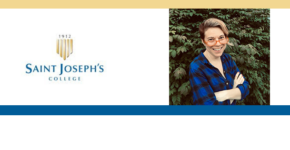Category: English
-

Rachel Gevlin, Birmingham-Southern College – What Novels Can Tell Us About Gendered Responses to Adultery
Novels have always been a way to understand a time and place. Rachel Gevlin, assistant professor of English at Birmingham-Southern College, discusses this in the context of relationships. Rachel Gevlin is Assistant Professor of English at Birmingham-Southern College. She received her PhD from Duke University in 2020 and her B.A. from Bennington College in 2010.…
-

Mark Canada, Indiana University Kokomo – Poe In His Right Mind
Are highly creative people more prone to madness? Mark Canada, professor of English at Indiana University Kokomo, explores the brain to find out. Mark Canada, Ph.D., is Executive Vice Chancellor for Academic Affairs and Professor of English at Indiana University Kokomo. A longtime champion of student success, he was a leading participant in the national…
-

Amy Lueck, Santa Clara University – English Professors Study More Than Books
English professors don’t always have their nose in a book. Amy Lueck, associate professor of rhetoric and composition at Santa Clara University, explains. Amy J. Lueck is Associate Professor of English at Santa Clara University, where her research and teaching focus on histories of rhetorical instruction and practice, women’s rhetorics, feminist historiography, and digital public…
-

Katrina Hoop, Saint Joseph’s College – The Sociological Imagination, Students’ Lives-As-Text, and Teaching During a Pandemic
COVID-19 is an invitation to think more sociologically. Katrina Hoop, associate professor of sociology at St. Joseph’s College, discusses teaching her students to think this way during this crisis. Katrina Hoop was drawn to the field of Sociology because it offers a unique perspective on how people make sense of their lives, understand each other’s…
-

Matthew Boedy, University of North Georgia – Student Reactions to Kent State and COVID-19
Higher education will look different after COVID-19. Matthew Boedy, assistant professor of rhetoric and composition at the University of North Georgia, looks to a past example of change to draw parallels to today. Matthew Boedy is an associate professor of English at the University of North Georgia in Gainesville, Georgia. His longform article on the…
-

William E. Engel, University of the South – The Printer as Author in Early Modern English Book History
On University of the South Week: One man had a big effect on English Reformation printing. William E. Engel, professor of English, discusses how these effects are still being felt today. Bill Engel received a Ph.D. from the University of California at Berkeley and specializes in medieval and Renaissance literature with an eye toward the…
-

Mary K. Holland, SUNY New Paltz – Contemporary Literature
Fictional stories can have an impact on our reality. Mary K. Holland, professor of English at SUNY New Paltz, explores how contemporary fiction is changing with the times. She is the author of two books, Succeeding Postmodernism: Language and Humanism in Contemporary American Literature (Bloomsbury 2013) and The Moral Worlds of Contemporary Realism (forthcoming from…
-

Joyce Kinkead, Utah State University – Slow Writing
Not everything has to be written digitally. Joyce Kinkead, distinguished professor in the department of English at Utah State University, examines bringing the slow movement to writing. Joyce Kinkead joined USU in 1982, taking on the role of director of the Writing Center and then director of the Writing Program. Since then, she has served…
-

Kenneth Roemer, University of Texas at Arlington – Create Yourself in Many Voices
Is your story fit for an autobiography? Kenneth Roemer, distinguished teaching professor at the University of Texas Arlington, looks into this question. Kenneth Roemer (B.A., Harvard; M.A., Ph. D., Univ. of Pennsylvania), a Piper Professor, Distinguished Teaching Professor, and Distinguished Scholar Professor at the University of Texas at Arlington, has received four NEH grants to…
-

Vera Tobin, Case Western Reserve University – Plot Twists
No spoilers please! Vera Tobin, assistant professor of cognitive science at Case Western Reserve University, examines how being fooled by a story can lead to great joy. I’m an associate professor of Cognitive Science at Case Western Reserve University, where I investigate connections between cognition, language, and narrative, with a special interest in cognitive bias and…
